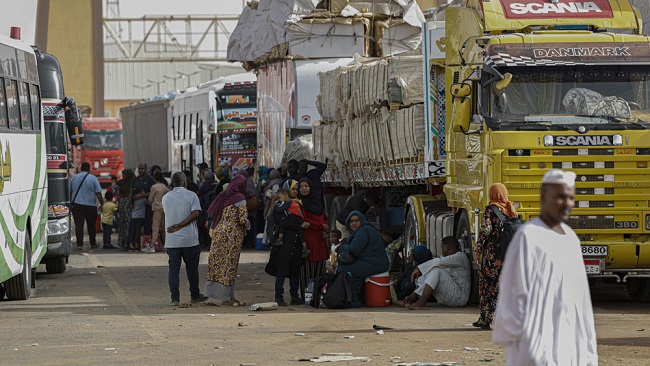Blasts rock Sudan’s capital as ‘humanitarian catastrophe’ looms
Fierce fighting continues in Sudan’s capital Khartoum, with both sides exchanging gunfire and accusations, even as their representatives are meeting in Saudi Arabia for talks to prevent a looming “humanitarian catastrophe.”
Army air strikes were reported on paramilitary forces, and brutal urban warfare continued in the capital on Saturday, according to witnesses.
“We keep hearing that there will be a truce, but then you go out in the street and there are bullets everywhere,” Sudanese citizen Wahag Gafar told AFP.
“We know that when they announce a ceasefire, the shooting will still continue,” she said.
The fighting erupted in mid-April between army chief Abdel Fattah al-Burhan and his deputy-turned-rival Mohamed Hamdan Daglo, who commands the paramilitary Rapid Support Forces (RSF).
UN refugee agency spokeswoman Olga Sarrado said some “200,000 refugees and returnees have been forced to flee the country, with more crossing borders daily seeking safety.”
The UN children’s agency UNICEF also warned about children after a factory in Khartoum, producing therapeutic food, had burned down.
“This is the darkest, most distinct illustration to date of how this conflict threatens the lives of children through multiple means,” said UNICEF spokesman James Elder.
In the meantime, Sudan’s ambassador to the UN, Al-Harith Idriss Al-Harith Mohamed said the government has the security situation under control.
Speaking at a press conference at the UN on Friday, he said that the “rebellion” by the RSF had failed to seize control of the country.
The number of Sudanese displaced in the war between generals have doubled to 700,000 in the past week, UN declares.
He said that the government and its armed forces had the upper hand in the current fighting, had not declared a state of emergency, and communication had not been disrupted.
Al-Harith said that women and children were suffering in the main cities and at border crossings.
“The humanitarian condition is bad,” he said.
He also said that there was an urgent need for clean water, food, mobile clinics and financial assistance for those who were crossing into neighboring countries.
Source: Presstv





